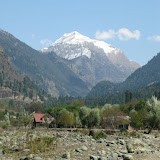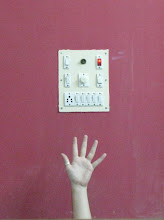Initially we hadn't planned on heading as far North as Kashmir, but a bit of shonky research on my part meant that if we'd gone to Nepal in January when initially planned we'd have both died of hypothermia as the mountains would be totally snow-covered by then, so this was probably our best opportunity to check out some of the Himalayas before the season ended - Nepal will have to wait for now. On paper, Kashmir is the probably the destination on our travels that presented the most risks, with its history of violent dispute over the state between India and Pakistan, hair-raising (and accident prone) mountain roads, and weather that can close in very quickly. Ironically though, the week we chose to go was probably one of the safer options - Pakistan suffered three appalling and fatal bomb blasts in Lahore and Islamabad from Taliban terrorists - they clearly had far more pressing problems than the Kashmir issue.
Our journey North to Palalgam in the Srinagar region of the Kashmir Valley took about eleven hours by Jeep, and was a stunning, if bumpy drive. Winding our way along the rugged Jammu-Srinagar road cut into the mountain side, barrierless sheer-drops gave way to steely blue glacial rivers crashing along the valley beds. Catching the occasional glimpse of the icy cold far below as the jeep rounded a tight bend was enough to give anyone a bout of vertigo. Even on a road as clearly dangerous and over populated with massive trucks, everyone still drove like there was a medal at the end; and we both went a few shades paler when our driver several times had to abort a failed overtaking on a blind corner at a two thousand feet. Part of the reason for the craziness of the Jammu-Srinagar road is that it's the main service route for supply convoys heading into the valley, and at points whole sections of road cut into the mountain can come to a standstill jammed with trucks travelling in one direction, causing the rest of the traffic to try and belt it down the wrong side of the road at full speed - until they see something else coming and then try and swerve out of their way...fun!
En route we passed the vast and controversial Baglihar Hydro-Electric Dam - a leviathon example of engineering shouldering hundreds of millions of tons of water between the valley walls. Our jeep driver mentioned it had only been open for just over a year, and had while it would undoubtedly solve lot of electrical problems for the region (once everyone was actually properly connected that is), it had been, and continued to be a source of a lot of aggravation. Water levels down river from the Dam had dropped, meaning irrigation for farming was more of a problem than ever and more disturbingly there had been significant displacement of population from villages and towns above the dam where it was flooded, which due to the the poor management and corruption of the authorities in the area was not handled well. The overriding impression was that it wasn't popular with the Kashmiris. Slightly unnerving too for the dams location are the regularity of earthquakes, as we discovered.
After passing through a few Army checkpoints to have our passports, purpose of visit and job (I still can't bring my self to say "unemployed" bizarrely) verified, we finally made it to the Kashmir Valley. The roads leveled off and we headed though endless small towns and villages and fields of crops being harvested. This region of Kashmir is almost 100% Muslim and its people, clearly used to cold winters and a lot of time in the open looked far more rugged and weather beaten than those further South. The small town we were staying in is apparently very popular with Indians for summer holidays, but was quiet when we arrived, being right at the end of the season. It was however one of the most attractive settings for a holiday you could imagine. Flanked by four thousand metre snowcapped mountains, and surrounded by alpine forest, with healthy looking horses grazing in lush green meadows next to fast flowing rivers and streams, we felt like we'd arrived in a real life version of one of those comedy moving pictures depitcting a far flung utopia with glowing waterfalls you get in Eighties Indian restaurants back home.
We stayed in a small basic cottage next to a river owned by a local Muslim family, and for the majority of the week just went on hikes around the valley, read a lot and tried to keep warm! There were no bars being an Islamic area, everything shut at 9pm, and for at least half of the day the electricity would go off (so much for the Dam!). It was already beginning to get pretty cold with some variable weather; temperatures were a few degrees only at night with no heating and snow was starting to fall heavily on the mountain tops. Ramzan our guide on a few of the longer treks told us that in only a month or so there would likely be several feet of snow. Kashmir must look incredible then, but also a pretty bleak place to live too. I asked him what he did during the winter to keep entertained. "Smoke". A man of few words. Clearly the fags in Kashmir actually make you fitter though, as he also told me that only a few months before he'd completed a two and half week trek to Ladakh in Eastern Kashmir with two Swiss brothers who spoke limited English, which is no short distance to cover over some pretty hostile glacial terrain and a pretty sizable language barrier to too... I wondered what kind of entertaining conversations two Swiss brothers and a quiet Kashmiri Muslim would have over the course of two and a half weeks? "Would you like some Chocolate? It's Swiss" "No thank you. Smoke?" "No thanks" "Oh look, a Mountain.."
One afternoon, came across something fairly shocking accoss while we were on a hike through some villages on the way up to the mountains. Walking through the last village before hitting the wilderness proper, it seemed almost like a ghost town, with a few people only dotted around looking sombre. As we left the village a man stood soberly with an automatic rifle stared at us as we walked past. "Policeman" Ramnzan told us. He went on to tell us that two days before, a Tiger had come down into the village in broad daylight, approached a group of small children playing in the street and attacked one; an eight year old boy, slashing him across the neck. The boy died later in the day from the severity of the injury and loss of blood. We must have looked shocked as he immediately assured us attacks on people here were extremely rare, but were not uncommon on horses and livestock, however, these tended to be at night and only when the Tigers were really hungry (on another trek he pointed out an old pony with huge gauge marks on is backside where a Tiger had once had attacked it).
The problem he informed us, was that because weapons are outlawed due to the political conflict, farmers cannot keep guns anymore - the penalties are severe. Twenty years ago he continued, if there were Tiger problems they could fire off warning shots which would usually do the trick, or if there was a single animal that was causing problems they could deal with it. Now farmers can't defend their livestock, (or children occasionally) from rogue animals. For an attack that took place only a few Kilometres from his own kids and home, he seemed extremely philosophical about it though. He told me that he also worked as a tracker too for the big cats in the area. "Tiger has been here for tens of thousands of years, longer than us, and we have killed a lot more of them".
With the colder weather moving in and the "nightlife" graveyard quiet, seven nights was enough for us in Kashmir, on this occasion. A diet of boiled veg, rice and supernoodles, cold showers that took half an hour to warm up from and limited conversation opportunities had, by the end of the week, got us more than a little enthusiastic about the 21st Century delights of our next stop - Delhi. A long haul South for sure, but a capital city with abundance of people, bars, shops that actually stocked things and restaurants that possibly knew how to do more than just boil everything in sight...
Getting the chance to spend the time we did in an environment as epic as Kashmir was an amazing experience and one that we were lucky to have had. Having got a taste for some accessible trekking in Himachal Pradesh and the Kashmir Valley, its really spurred me on to want to tackle some larger treks to Ladakh further East, but this is something that a separate, better organised trip probably calls for. Without doubt it's a fascinating and beautiful region that deserves a return visit. Just need to remember to bring a some thermal pants and decent bottle of whiskey next time...
View our pics here:
 |
| Kashmir & Jammu |

Hi Guys
ReplyDeleteHave enjoyed reading your blog and looking at photos. You are both so lucky it looks amazing. Great diary Ben. Love you. Mum/Gill